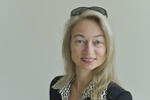Arabic Studies Scholar Beatrice Gründler Receives 2017 Leibniz Prize from the German Research Foundation
Scholar from Freie Universität Is One of Ten to Receive Germany's Most Important Research Award / 2.5 Million Euros for Research / Press Picture
№ 434/2016 from Dec 08, 2016
Arabic studies scholar Prof. Dr. Beatrice Gründler from Freie Universität Berlin has won a Leibniz Prize for 2017 from the German Research Foundation (DFG). Gründler was selected by the Joint Committee from among 134 nominees, as the DFG announced on Thursday in Bonn. Prof. Dr. Ralph Hertwig, a cognitive psychologist and director of the Center for Adaptive Rationality at the Max Planck Institute for Human Development, who is also an adjunct professor at Freie Universität, is another one of the ten winners, three women and seven men. The Gottfried Wilhelm Leibniz Prize is the most important research award in Germany. Each of the ten winners will receive 2.5 million euros in prize money to support their future research. The award ceremony will take place on March 15, 2017, in Berlin.
The press photo may be used free of charge in connection with reporting on the Leibniz Prize, provided that due credit is given to the photographer, Bernd Wannenmacher.
The president of Freie Universität, Prof. Dr. Peter-André Alt, said, "We are very pleased that Beatrice Gründler, an outstanding scholar with an international reputation, has been awarded the most important German research award. It is further confirmation for the excellence of humanities at Freie Universität Berlin as well as for the significance of non-European languages and literatures in the humanities in Germany." Prof. Dr. Peter-André Alt also congratulated the director of the Center for Adaptive Rationality at the Max Planck Institute for Human Development. He said, "As an adjunct professor at our university, Ralph Hertwig is instrumental expanding our close cooperation with the Max Planck Institute for Human Development in the fields of cognitive psychology and decision research. Hertwig is a well-known scientist with an international reputation and very worthy of the Leibniz Prize."
According to the DFG, Beatrice Gründler, who was born in 1964, was awarded the Leibniz Prize for her studies on the diversity of Arabic poetry and culture. Very early in her academic career, she turned to the medium of writing with its fundamental significance for Arabic traditions, for example in her book, The Development of the Arabic Script (1993). Based on her research, Gründler has "developed a complex history of the media of the Arabic world," that ranges from the introduction of paper to printing books and beyond. In this context the DFG quotes Gründler herself, who spoke of an "Arabic book revolution." Furthermore, according to the DFG, in the pilot project Gründler has been working on since 2015, a digital critical and commented edition of "Kalila wa-Dimna," she succeeded in producing a complete presentation of the text as well as the history of the origin and reception of one of the earliest Arabic works of fiction and a central text in the Arabic tradition of fables. The DFG stressed that the encounters between Arabic and European traditions of knowledge that Gründler explores in her works are characteristic for her approach in general, which is part of what makes her research so important.
Beatrice Gründler studied in Strasbourg, Tübingen, and at Harvard, where she earned her doctorate in 1995. After a year as a Visiting Assistant Professor of Arabic Language and Literature at Dartmouth College, she taught at Yale University, beginning in 1996 as an assistant professor, and since 2002 as a professor of Arabic literature. In 2014 she returned to Germany, where she has been teaching and doing research at Freie Universität Berlin ever since. She is currently a principal investigator at the Friedrich Schlegel Graduate School of Literary Studies and the Berlin Graduate School Muslim Cultures and Societies. At the latter, along with Dimitri Gutas, a professor of Graeco-Arabic studies at Yale University and an Einstein Visiting Fellow, she heads a project funded by the Einstein Foundation Berlin that aims to produce a multi-language edition of the Poetics of Aristotle. It includes research into the cultural context of the Arabic, Hebrew, Syrian, and Latin translations. At the same time, as part of an e-learning project, she is also working on the digital edition of a type of courtly literature called “mirrors for princes” in the form of animal fables, which came to Europe from India via the Arabic world. Gründler is a member of the board of the Dahlem Humanities Center at Freie Universität Berlin. She has been the president of the American Oriental Society since 2016.
The Gottfried Wilhelm Leibniz Prize is the most important research award in Germany. The Leibniz Programme, established in 1985, aims to improve the working conditions of outstanding researchers, expand their research opportunities, relieve them of administrative tasks, and help them employ particularly qualified early career researchers. Prize winners are first chosen from a slate of nominations put forward by third parties. The final selection is made by the Joint Committee on the basis of a recommendation from the Leibniz Nominations Committee.
So far, 17 scholars and scientists from Freie Universität Berlin have won a Leibniz Prize.
Links
- www.fu-berlin.de/en/forschung/kommunikation/preise/leib/index.html
- http://www.geschkult.fu-berlin.de/en/e/semiarab/arabistik/Seminar/Mitarbeiterinnen-und-Mitarbeiter/Professuren/Gruendler/index.html
- https://www.mpib-berlin.mpg.de/de/forschung/adaptive-rationalitaet
- www.dfg.de/leibniz-preis/
Further Information
Prof. Dr. Beatrice Gründler, Department of History and Cultural Studies, Freie Universität Berlin; Seminar for Semitic and Arabic Studies; Tel.: +49 30 838 60489, Email: beatrice.gruendler@fu-berlin.de
Press Photo
The press photo may be used free of charge in connection with reporting on the Leibniz Prize, provided that due credit is given to the photographer, Bernd Wannenmacher.
Press Contact Person for Information about Prof. Dr. Ralph Hertwig, Director, Center for Adaptive Rationality, Max Planck Institute for Human Development
Kerstin Skork, Head of Public Relations, Max Planck Institute for Human Development, Tel.: +49 30 824 06-211, Email: skork@mpib-berlin.mpg.de

